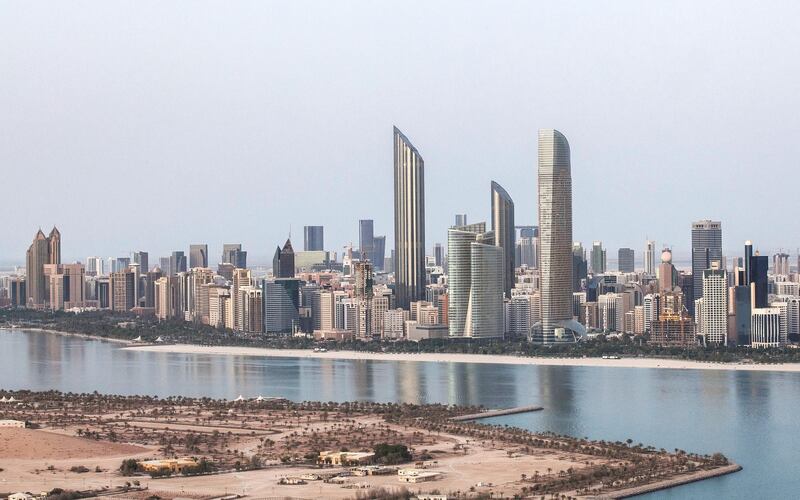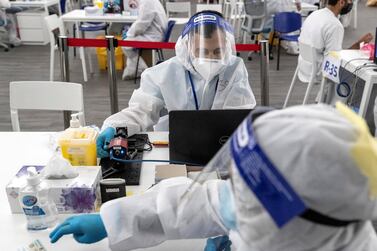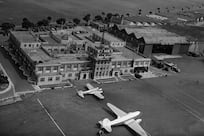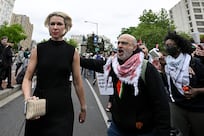Abu Dhabi’s economy will expand by 6 per cent to 8 per cent over the next two years, with the oil sector, financial services, government spending and foreign investment driving the growth, a senior government official said.
The expansion from 2021 to 2022 comes after a dip in gross domestic product of about 3 per cent to 4 per cent this year, and will depend on the Covid-19 pandemic and the global trade environment, Mohammed Al Shorafa, chairman of the Abu Dhabi Department of Economic Development, told The National.
“Abu Dhabi’s economy is very resilient in terms of external shocks. Don’t forget that Covid has disrupted a lot of global systems and logistics chains and everyone has to find ways to resolve those issues,” he said.
“We have not stopped any of our capital investment, it is a testament that the economy is still continuing, the government is still spending and the government support is in all different angles of the economy.”
Abu Dhabi, which holds about 6 per cent of the world’s proven oil reserves, is taking measures to help its economy rebound amid the virus-induced slowdown and cheaper oil prices.
The government has launched economic stimulus packages worth several billions of dirhams to soften the blow of the pandemic on businesses and citizens as it presses on with its economic diversification goals.
Mr Al Shorafa, who is also a member of the Abu Dhabi Executive Council, said the pandemic had further hastened the emirate's existing strategy to invest in advanced technology in areas that range from artificial intelligence to e-commerce.
“Abu Dhabi had a plan even before the pandemic and we are pushing even harder to get all of these online,” he said.
Having Abu Dhabi’s holding company ADQ, government-related entities and the private sector “working hand in hand and developing our economic strategy is now the most important thing in getting it done”, he said.
The emirate is positioning itself as a technology hub and seeking to attract companies in sectors that are crucial to its growth such as agricultural technology, health care and renewable energy.
It is focused on projects that invest in innovative start-ups, develop strategic industries such as local manufacturing and make it easier to do business in the emirate.
“For the future economic growth of Abu Dhabi, the strategy is very simple: it is how to be as competitive as possible to attract companies, start-ups [and] innovators, and creating the right ecosystem for them here, not only to come and work but to live, retire [and] get more education,” said Mr Al Shorafa.
“This is to enable specific clusters that we believe are important for the growth of Abu Dhabi going forward.”
The Abu Dhabi Investment Office, of which he is also chairman, was launched in 2019 under the Dh50 billion ($13.6bn) Ghadan 21 economic stimulus programme.
It is a government body tasked with overseeing foreign direct investment and private sector development in the emirate.
Adio is promoting Abu Dhabi as an investment destination and a hub for technology companies.
It invested $100 million in four agri-tech companies – AeroFarms, Madar Farms, RNZ and RDI – in April to help them build research and development facilities and food production centres in Abu Dhabi.
“What is on our table now is the recent peace accord signed between Abu Dhabi and Israel. This will attract more innovation and technology entities to Abu Dhabi,” Mr Al Shorafa said.
“Being part of the SMEs and innovation sector will add to the GDP in Abu Dhabi.”
Adio said in September that it planned to set up the first of a series of representative offices in Israel. The office in Tel Aviv will focus on "facilitating connections between innovation-focused companies" and other organisations in Abu Dhabi and Israel.
Mr Al Shorafa, who was appointed chairman of the Abu Dhabi Securities Exchange in September, also said the bourse is working with the Abu Dhabi government on a comprehensive plan to develop the financial sector as it is one of the main contributors to the emirate's non-oil economy.
“Because of the [Covid-19] situation, the oil prices and the global issues happening around us, ADX, in the last six to eight months, has put a strategy to develop a complete financial sector development plan,” Mr Al Shorafa said.
“We are trying to energise the financial ecosystem by attracting more financial instruments, by making it easier for entities to list on the Abu Dhabi market and [by focusing on] customer-centricity.”
ADQ will create a market-maker that is expected to “give a big boost” to the market, he said.
Mr Al Shorafa expects an increase in initial public offerings by family businesses and government-related institutions on the ADX, as well as an increase in the number of shares that float freely.
“Being part of MSCI helped in terms of getting more institutional investors and more passive investors but we are trying to balance now between retail and institutional investors to create more credibility in the market,” he said.
The ADX is seeking more international listings as a long-term strategy and developing a series of initiatives, particularly on cross-border regulations, to attract more foreign companies, he said.








